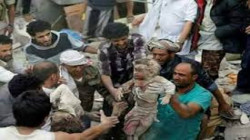Inactive International Law in Yemen: Report
When politics shows its red teeth with a general absence of the most basic human standards, it produces a situation similar to that in Yemen.
The US-Saudi-led coalition of war against Yemen were not content with killing by only air strikes that affect most of the Yemeni cities and on a daily basis targeting civilians (according to UN neutral reports).
Rather, they pursue those who have not been killed by warplanes’ missiles to kill them through a comprehensive blockade (on land, sea, and air) imposed by Saudi-funded American warships and warplanes. This is an unprecedented unscrupulousness in modern history, thus indifferently trampling on the international legitimacy, represented by the United Nations and its Security Council, which has not granted them any right to do so in all its resolutions regarding.
The norms of international law and the UN Charter consider this as a crime against humanity, requiring that its perpetrators must be held accountable before the international criminal courts.
Of course, this blockade, which is documented by the reports of the UN and neutral organizations, has caused death to thousands of children as a result of the shortage of medicine or food due to the blockade.
It also causes death to many elderly people and thousands of patients with various types of incurable diseases that Yemen lacks medical treatment for them.
Still, they deprive all citizens of traveling for life-saving treatment abroad or for any other reason, unless the travelers are forced to bear the pains and risks of traveling by road in areas controlled by their mercenaries through a precarious journey for at least 20 hours by car.
There has been surprisingly little discussion about the international legal justification for the airstrikes in Yemen that are being led by the Saudis, that tackles some of the legal issues, the media and those using force have spent almost no time discussing whether the Saudi-led coalition’s intervention raises legal questions.
That in itself is notable. States seem to be making fewer efforts these days to discuss their international justifications for using force (with a few exceptions), and few other states are demanding clear explanations for the force.
This could become an even more salient problem if the regional military force that the Arab League is discussing takes shape. The existence of such a force increases the likelihood that we will see military interventions by states that do not seem committed to articulating legal justifications.
Instead of easing the unjust embargo on Yemen, America and Saudi Arabia recently tightened it and seized all ships loaded with diesel and gasoline (more than 22 ships with UN pass permits) to exacerbate the disaster.
As fuel is running out in health institutions, hospitals, and water and electricity generators, this warns of a mass catastrophe for millions of Yemenis.
More than 80% of the population depends on this port for obtaining oil derivatives, staple foods, medicines and medical supplies.
The actions and statements of the UN Envoy to Yemen, “Griffiths”, showed his clear alignment with the Countries of War Coalition against Yemen, as he never blames the coalition countries for their deliberate seizing of various ships and vessels loaded with necessary and indispensable materials such as oil derivatives, food and medicine. Rather, he linked the release of those ships to the agreement between Sana’a National Salvation Government and the coalition mercenaries regarding revenues to support the salaries; even though they did not fulfill what was agreed upon.
Nevertheless, the world conscience and many free and honest voices in the world are still keeping silent about these inhuman and immoral crimes against the esteemed Yemeni people, who are punished only because they have chosen to take off the garment of cheap dependency on Saudi Arabia.
Under international humanitarian law, parties to a conflict must allow and facilitate the rapid and unimpeded passage of impartially distributed humanitarian aid to the population in need. The parties must consent to allow relief operations and may not refuse such consent on arbitrary grounds.
In addition, international humanitarian law requires belligerent parties to ensure the freedom of movement of humanitarian relief personnel essential to the exercise of their functions. This movement may be restricted only temporarily for reasons of imperative military necessity.
Serious violations of international humanitarian law committed with criminal intent—that is, deliberately or recklessly—are war crimes. War crimes, listed in the “grave breaches” provisions of the Geneva Conventions and as customary law in the International Criminal Court statute and other sources, include a wide array of offenses for which individuals may be held criminally liable —deliberate, indiscriminate, and disproportionate attacks harming civilians; hostage taking; using human shields; and imposing collective punishment, among others. Individuals also may be held criminally liable for attempting to commit a war crime, as well as assisting in, facilitating, aiding, or abetting a war crime.
Responsibility also may fall on people planning or instigating a war crime. Commanders and civilian leaders may be prosecuted for war crimes as a matter of command responsibility when they knew or should have known about the commission of war crimes and took insufficient measures to prevent them or punish those responsible.
The coalition countries and their mercenaries continue to violate the Stockholm Agreement through indiscriminate attacks on citizens’ homes in Hodeidah and its various districts, especially what happens to Al-Durayhimi district due to the suffocating siege. They prevent the entry of various humanitarian aids in the absence of UN representatives and its organizations in Hodeidah, which is a flagrant violation of the rules and provisions of international humanitarian law.
The United Nations and its organizations bear legal and moral responsibility for the suspicious and flawed silence and disregard for the practices carried out by the coalition countries in their total blockade and the imposition of arbitrary restrictions on the entry of oil derivatives ships to the port of Hodeidah to unload their cargo.

